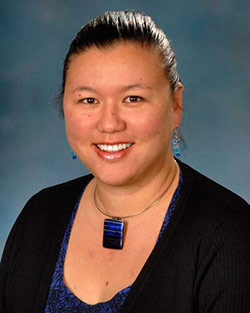Newswise — University of Maryland School of Medicine (UMSOM) researchers at the Center for Vaccine Development and Global Health (CVD) have been awarded $3.96 million to develop a maternal vaccine that prevents sepsis caused by Klebsiella pneumoniae in newborns and infants.
The research study will continue the development of a first-of-its-kind vaccine against Klebsiella pneumoniae, a potentially fatal infection in babies born in India, Pakistan, Bangladesh, and many African countries. The vaccine could also potentially be used to prevent hospital-acquired K. pneumoniae sepsis infections worldwide.
Funding is being provided by Combating Antibiotic-Resistant Bacteria Biopharmaceutical Accelerator (CARB-X), a global non-profit partnership dedicated to supporting early-stage antibacterial research and development to address the rising threat of drug-resistant bacteria.
CVD scientist Sharon Tennant, PhD, Professor of Medicine at UMSOM, began development of the vaccine with Alan Cross, MD, Professor of Medicine at UMSOM, 10 years ago, which was first evaluated in adult animal models. “We are grateful for the funding and support from CARB-X to further develop our K. pneumoniae vaccine to prevent sepsis in neonates,” said Dr. Tennant. “This funding will allow us to continue our efforts to prevent these infections and to hopefully ensure that families can one day experience the joy and wonder of a healthy baby instead of tragedy.”
She heads a research team that includes Dr. Cross and Scott Baliban, PhD, Assistant Professor of Medicine and CVD researcher at UMSOM. They are working in partnership with Auro Vaccines Private Limited (Auro Vaccines), based in Hyderabad, India. Auro Vaccines is a step-down subsidiary of Aurobindo Pharma Limited, India.
If their study demonstrates that the new modified vaccine can protect against K. pneumoniae infections in animal studies, the vaccine can then be evaluated in human clinical trials to test its safety and efficacy.
Neonatal sepsis is a life-threatening response to bloodstream infections that occur in newborns fewer than 28 days old. Due to their immature immune systems, newborns are particularly susceptible to infections. The landmark BARNARDS study estimated that 2.5 million neonates or infants in the first month of life die annually of sepsis, with the greatest burden in low- and middle-income countries. Currently, no vaccine is available to prevent K. pneumoniae infections. The only option is to treat infected babies with IV fluids and antibiotics, and to provide treatment as quickly as possible to prevent the rapid progression of the infection which can cause multiple organ failure that leads to death.
“The risk of death from sepsis increases 7.6 percent for every hour that treatment is delayed, which can be an insurmountable challenge in countries lacking easy access to pediatric hospital care,” said Mark T. Gladwin, MD, who is the John Z. and Akiko K. Bowers Distinguished Professor and Dean, UMSOM, and Vice President for Medical Affairs, University of Maryland, Baltimore. “Combine this with the rise in treatment-resistant infections due to the overuse of antibiotics, and we see how urgent the need is to have a vaccine to prevent this deadly condition in our most vulnerable babies.”
The CVD vaccine, which targets the surface sugars of K. pneumoniae, is expected to be given to pregnant women, thereby protecting their babies from this deadly infection. The conjugate vaccine targets four types of surface sugars that account for more than 80 percent of K. pneumoniae infections. If successful, researchers expect the vaccine will prevent the vast majority of K. pneumoniae neonatal sepsis infections. The CARB-X award supports examining the feasibility of this project to reach a high potential impact for the vulnerable patient population. There is currently no K. pneumoniae vaccine on the market.
“This investment from CARB-X will help to accelerate development of this vaccine to prevent Klebsiella infections in young babies,” said Miriam Laufer, MD, MPH, FASTMH, Interim Director of the CVD. “The CVD has participated in research that has highlighted the importance of K. pneumoniae in causing serious infections in young infants in resource limited settings. We are excited to continue development of a vaccine that can prevent these infections and save lives. The CVD has an outstanding record of developing vaccines for global use against high priority pathogens, and this effort will build on that experience.”
Added Erin Duffy, PhD, R&D Chief of CARB-X: “With this award, the CVD team has even greater potential to bring a maternal vaccine for neonatal sepsis to market and save the lives of millions of infants worldwide, especially in low-and-middle income countries through its global partnership with Auro Vaccines of India.By vaccinating expectant mothers, the risk of neonatal sepsis might be reduced substantially as babies who are too young to be vaccinated would receive antibodies from their mothers in utero as well as through breastfeeding after birth.”
CARB-X funding for this research is supported by federal funds from the U.S. Department of Health and Human Services (HHS); Administration for Strategic Preparedness and Response; Biomedical Advanced Research and Development Authority; under agreement number 75A50122C00028, and by awards from Wellcome (WT224842), Germany’s Federal Ministry of Education and Research (BMBF), the UK Department of Health and Social Care as part of the Global Antimicrobial Resistance Innovation Fund (GAMRIF), the Public Health Agency of Canada (PHAC), the Bill & Melinda Gates Foundation, and the Novo Nordisk Foundation. The content of this press release is solely the responsibility of the authors and does not necessarily represent the official views CARB-X or its funders.
About the University of Maryland School of Medicine
Now in its third century, the University of Maryland School of Medicine was chartered in 1807 as the first public medical school in the United States. It continues today as one of the fastest growing, top-tier biomedical research enterprises in the world -- with 46 academic departments, centers, institutes, and programs, and a faculty of more than 3,000 physicians, scientists, and allied health professionals, including members of the National Academy of Medicine and the National Academy of Sciences, and a distinguished two-time winner of the Albert E. Lasker Award in Medical Research. With an operating budget of more than $1.2 billion, the School of Medicine works closely in partnership with the University of Maryland Medical Center and Medical System to provide research-intensive, academic, and clinically based care for nearly 2 million patients each year. The School of Medicine has nearly $600 million in extramural funding, with most of its academic departments highly ranked among all medical schools in the nation in research funding. As one of the seven professional schools that make up the University of Maryland, Baltimore campus, the School of Medicine has a total population of nearly 9,000 faculty and staff, including 2,500 students, trainees, residents, and fellows. The combined School of Medicine and Medical System ("University of Maryland Medicine") has an annual budget of over $6 billion and an economic impact of nearly $20 billion on the state and local community. The School of Medicine, which ranks as the 8th highest among public medical schools in research productivity (according to the Association of American Medical Colleges profile) is an innovator in translational medicine, with 606 active patents and 52 start-up companies. In the latest U.S. News & World Report ranking of the Best
Medical Schools, published in 2023, the UM School of Medicine is ranked #10 among the 92 public medical schools in the U.S., and in the top 16 percent (#32) of all 192 public and private U.S. medical schools. The School of Medicine works locally, nationally, and globally, with research and treatment facilities in 36 countries around the world. Visit medschool.umaryland.edu.
About the Center for Vaccine Development and Global Health at the University of Maryland School of Medicine
For over 40 years, researchers in the Center for Vaccine Development and Global Health (CVD) have worked domestically and internationally to develop, test, and deploy vaccines to aid the world's underserved populations. CVD is an academic enterprise engaged in the full range of infectious disease interventions, from basic laboratory research through vaccine development, pre-clinical and clinical evaluation, large-scale pre-licensure field studies, and post-licensure assessments. CVD has created and tested vaccines against cholera, typhoid fever, paratyphoid
fever, non-typhoidal Salmonella disease, shigellosis (bacillary dysentery), Escherichia coli diarrhea, nosocomial pathogens, tularemia, influenza, coronaviruses, malaria, dengue, ebola, and other infectious diseases. CVD's research covers the broader goal of improving global health by conducting innovative, leading research in Baltimore and around the world. Our researchers are developing new and improved ways to diagnose, prevent, treat, control, and
eliminate diseases of global impact, including COVID-19. In addition, CVD's work focuses on the ever-growing challenge of antimicrobial resistance.
About CARB-X
CARB-X (Combating Antibiotic-Resistant Bacteria Biopharmaceutical Accelerator) is a global non-profit partnership dedicated to supporting early-stage antibacterial research and development to address the rising threat of drug-resistant bacteria. CARB-X supports innovative therapeutics, preventatives and rapid diagnostics. CARB-X is led by Boston University and funded by a consortium of governments and foundations. CARB-X funds only projects that target drug-resistant bacteria highlighted on the CDC’s Antibiotic Resistant Threats list, or the Priority Bacterial Pathogens list published by the WHO, with a priority on those pathogens deemed Serious or Urgent on the CDC list or Critical or High on the WHO list. https://carb-x.org/ | X (formerly Twitter) @CARB_X
About Auro Vaccines
Auro Vaccines Pvt. Ltd. is a step-down subsidiary of Aurobindo Pharma Limited, India. Its state-of-the-art facility for vaccine R&D and manufacturing, situated at Hyderabad, Telangana, India, was set-up in 2018 over a 14-acre campus. The facility is designed to manage complete life cycle of vaccines staring from cell banks to commercial supplies of drug products. The unit and its systems are designed to meet WHO-Geneva standards, other major regulatory and cGMP requirements.





